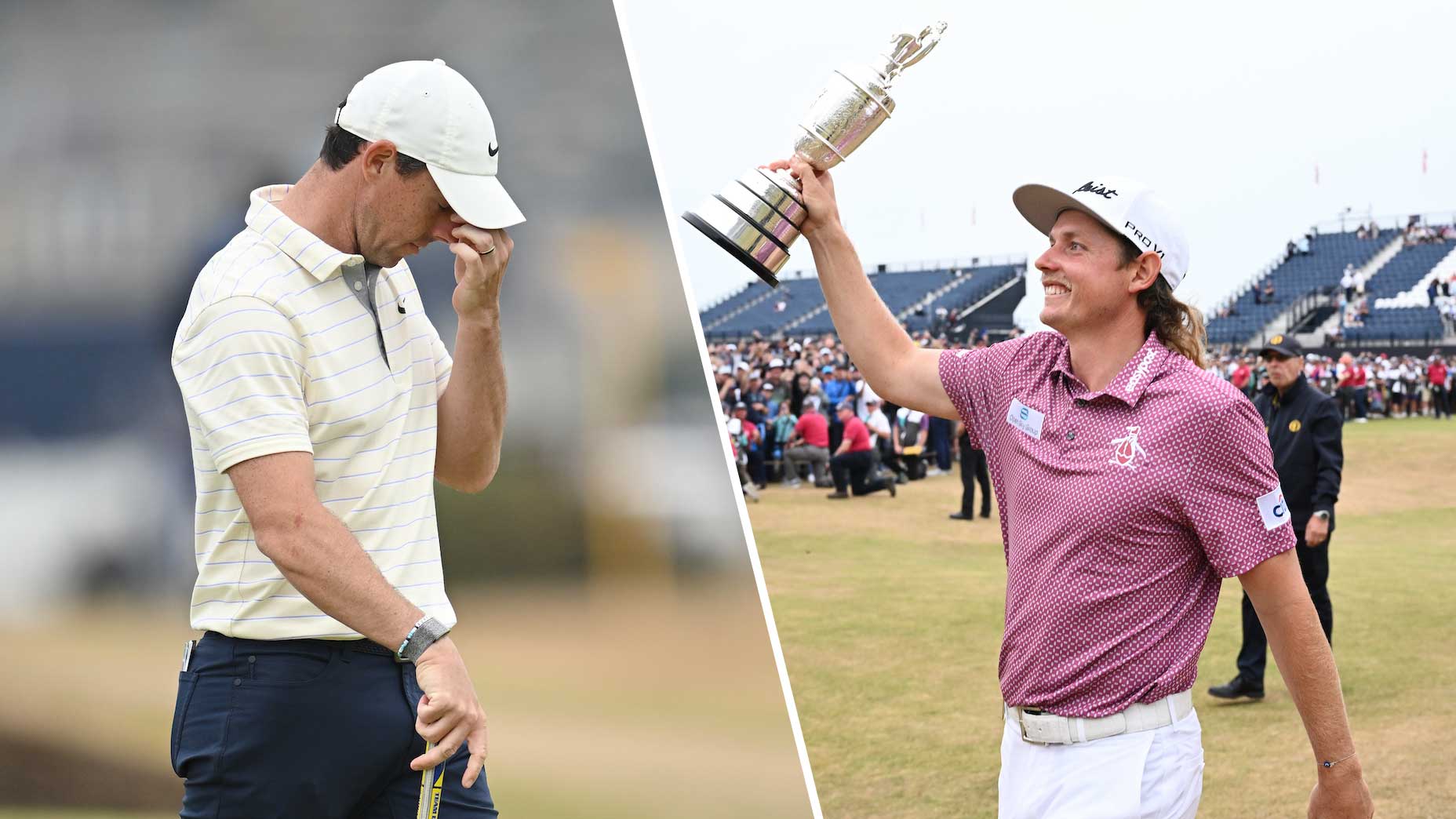Hayden Springer, who came to Bermuda at No. 125 in the FedEx Cup, shot a 6-under 65 for a share of the lead at the Butterfield Bermuda Championship.
How Rory McIlroy’s dream weekend dissolved into Cam Smith’s Open coronation


Cameron Smith is your 2022 Open Champion.
Getty Images
ST. ANDREWS, Scotland — Rory McIlroy exhaled as he walked out the back of the interview tent. He’d gamely gone through the wringer of post-round interviews — NBC, Sky Sports, radio, then the larger pool of reporters — with his head held high. He’d talked about how well he’d played. About how much there was to be proud of. It’s not life or death, he said. He almost seemed to believe that. But then he left his final interview and re-entered his actual life, and the weight of what had just happened seemed to suddenly, finally hit.
McIlroy’s wife Erica was waiting for him just around the corner, stationed beside a golf cart ready to whisk them away. Up to this point, Rory had kept a strong front. He’d cheered the crowd behind 18. He’d shaken hands, thanked officials, greeted volunteers. He’d answered every question. Now he crumpled into his wife’s arms. The two shared a long embrace, an affirmation that eight years is a long time to carry a heavy burden. That all of this meant exactly as much as it seemed from the outside. And then, as they slid into the back seat of the cart, Rory buried his head in Erica’s shoulder and wept as they drove off into the night.
Cameron Smith’s voice boomed over the loudspeaker. Just over the bleachers, some 200 yards away, the Aussie was addressing a group of jubilant fans encircling the 18th green. He held the claret jug aloft. He wondered aloud how many beers could fit within. The newest Open Champion intimated that later Sunday night, he’d find out.
Smith was being presented with the trophy just yards from where he’d secured it. He’d won his first major by navigating two of the world’s oldest and most storied hazards, skirting his way around the Road Hole bunker at No. 17 and playing directly through the Valley of Sin at No. 18. (This golf course has been around nearly a half-millennium. There’s a name for basically everything.) He’d closed with a ridiculous six-under 30 to finish off a preposterous final round of eight-under 64. The jug was well-earned. The beers will be, too.
“I think, to win an Open Championship in itself is probably going to be a golfer’s highlight in their career,” said Smith, grinning ear-to-ear. “To do it around St. Andrews, I think is just unbelievable.”
The cruelest bits of sports are the near-misses. Success is dangerous because it gets you that much closer to heartbreak. Triumph and failure are next-door neighbors. You can hear the sports-talk radio debate now: Did Cam win the Open, or did Rory lose it?
Smith won it, of course. He played the round of his life, putting like there was a magnet at the bottom of the cup. He made one clutch putt, and then he made another, and then he made three or four more. He seized this win. He deserves it.
But McIlroy lost, too. To be at St. Andrews on the weekend was to recognize that with near-unanimity, every fan in attendance was pulling for the Northern Irishman. That didn’t mean they were rooting against Smith. But it meant they hoped to carry Rory home to victory. When they couldn’t, he felt it. They did, too.
The final round began as a two-horse race. Viktor Hovland, World No. 9, was in contention at a major for the first time, seeking validation. Rory McIlroy was beside him, seeking rebirth. His first major championship in eight years. Symbolism and destiny seemed to be on his side; here he was, playing his best golf in years, taking the torch from Tiger Woods and trying to hold it aloft. They each began the day at 16 under par, four shots clear of the field.
Justin Thomas finished his final round as McIlroy was warming up on the range. He offered praise for his friend but also some words of caution.
“I think that’s really underrated to be able to perform with those expectations and that pressure,” Thomas said of McIlroy. “So today’s going to be hard to win the golf tournament because it’s hard to win a golf tournament. It’s going to be really hard for anybody but especially him, because of the amount of people that are pulling for him.”
He had heard the volume of cheers that followed McIlroy around the Old Course all week. The fans wanted it for Rory. He wanted it for the fans, too. Since his last PGA Championship win in 2014, McIlroy has won bunches of PGA Tour events and a Players Championship and everything but a major championship. Everything but. This, the 150th Open at the oldest golf course in the world, was his best chance to fill that void. How could there be a better chance?
But McIlroy and Hovland, as it turned out, was the wrong two-horse race. Hovland three-putted for par at No. 4 and never seriously rejoined the action. Up ahead, Cameron Smith birdied the second hole. Then he birdied the fifth hole. Still, McIlroy also birdied the fifth, maintaining a two-shot lead over Hovland and three over Smith. The entire front nine it felt like McIlroy’s tournament to win or lose.
Then Smith upended that arithmetic. His birdie run began at No. 10 and continued with putts at 11, 12 and 13. When he navigated a challenging two-putt at No. 14 — five in a row! — Smith took the outright lead at 19 under par. It was a lead he would never relinquish.
“The putt on 11 was a pretty good distance, probably 20 feet,” Smith said. “When that one dropped, yeah, I could see the hole getting a lot bigger on that back nine for sure.”

Smith surged down the back nine on Sunday with five straight birdies.
Getty Images
One group behind, McIlroy looked in full control of his golf ball. He dodged bunkers, avoided disaster and played the exact brand of conservative, calculated golf that had gotten him to this point — the exact brand Tiger Woods recommended to begin the final round. He hit an unthinkable 18 greens. If you’d offered him 18 greens in regulation beginning the day, McIlroy would have guaranteed victory. But he matched that number with an unthinkable 36 putts, logging two two-putt birdies and 16 two-putt pars and zero one-putts of any kind. His last real hope came at No. 17, the hardest hole on the course, where he pummeled a perfect drive down the left-center fairway and left himself a 15-footer for birdie. No dice.
That same hole had served as Smith’s unofficial coronation. His approach shot had settled just short of the devilish front left bunker, with the hole just on the other side. He was suddenly jailed, positively stymied by St. Andrews’ strategic challenge. Two decades ago, when Tiger Woods was playing the best golf of any player ever, he faced a near-identical approach on Sunday at the 17th. He chipped sideways onto the putting surface and happily escaped with bogey.
But it’s possible the ghosts of Tom Morris have never seen a putter quite as hot as Smith this week. Rather than risk a flop shot, Smith wielded his most powerful weapon and putted his third just outside the orbit of the bunker so that it settled pin-high, some 10 feet from the cup.
He put that in the middle.
The crowd cheered as Smith walked up the 18th fairway, where his drive settled at the front edge of the green. They cheered again as he knocked his second inside three feet. And they cheered as he finished that off to post 20 under par, a major championship record.
Now McIlroy needed an eagle 2 to force a playoff. The crowd carried him down the final fairway. They roared in the bleachers, expressing encouragement and thanks and condolences all at once. Rusacks Hotel looms over the right side of the 18th fairway. All week, McIlroy has been staying in a room overlooking the course. Every day, he said, he allowed himself the chance to gaze out at the scoreboard across the fairway and imagine his name at the top.
“You’ve got to let yourself dream,” he said.
McIlroy’s last-ditch pitch was overaggressive — who could blame him? — and he missed the comebacker, settling for 4 and a misleading third-place finish; Cameron Young had made eagle just moments before to seal a stellar 65 and finish one shot behind Smith.
Nearly an hour after his win, Smith still hadn’t checked his phone. He laughed at the thought of what he’d find when he got a hold of it.
“When you win golf tournaments, you have friends that you didn’t even know were friends,” he said. “So I’m going to be busy.”
That checks out. Success has many fathers, they say, while failure is an orphan. McIlroy had legions of supporters. But their dreams only added to the weight of his own. Now, he carries the burden alone.
“It’s just a matter of keep knocking on the door, and eventually one will open,” he said.
As for Smith? With the win, he’s up to No. 2 in the world, the highest ranking of his career. The claret jug will find good company beside the Players Championship trophy on his mantle. He has established himself as a generational putter, a mulleted, mustachioed magician who can make golf balls disappear into the ground.
It was a historic ending to a historic championship, a record-setting back-nine to shoot 64, the lowest final-round score ever at the Old Course.
Then, as the TV cameras were cleared from the 18th green and the crowds dispersed to St. Andrews’ pubs, the barriers around the course came down. Every non-major Sunday, the Old Course belongs to the town. And now the town reclaimed it. They strode across the hallowed final fairway — fans and families, dogs and owners, kids with dream — reliving what they’d just seen: history.
And they wondered who would come next.


